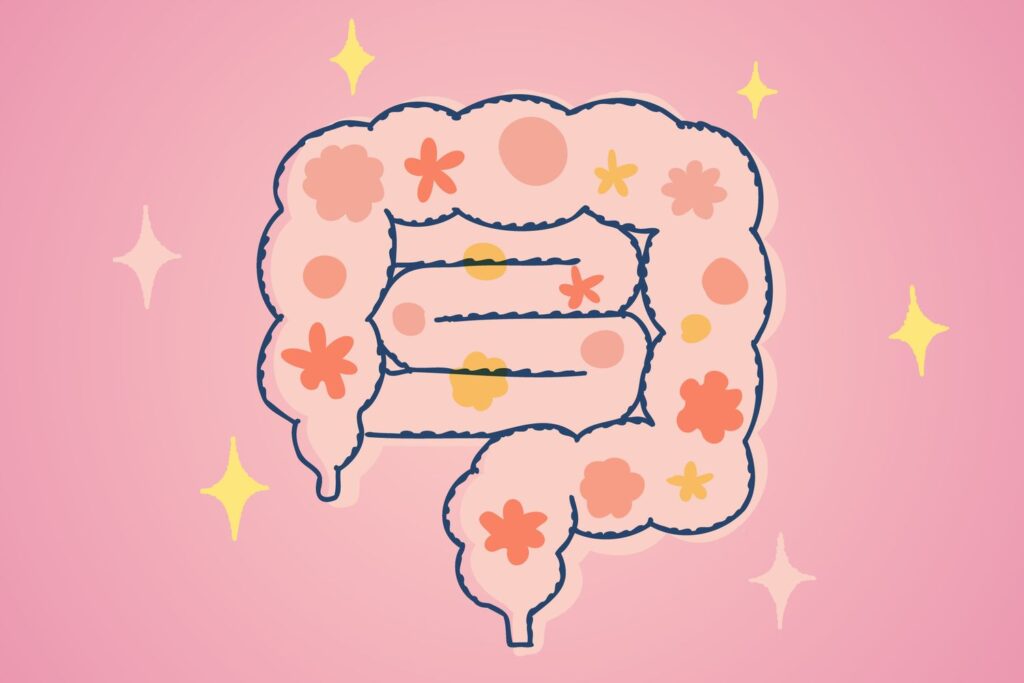- The gut microbiome influences your health, including inflammation and illness.
- This study suggests a strong connection between gut health and healthy aging and longevity.
- Include plenty of fermented foods and fiber in your diet to support a healthy gut.
Hippocrates, the father of modern medicine, has been credited with the saying that “all disease begins in the gut.” And even though he lived from 460 to 377 BCE, well before today’s technology or even the microscope, modern research has indicated that he may have had the right idea.
The gastrointestinal tract is home to approximately 100 trillion microorganisms, including bacteria, fungi, viruses and other microbes—both beneficial and harmful. Some of these organisms are immune cells that constantly communicate with the other microorganisms in the gut. There is a delicate balance in these microorganisms that needs to take place. When it’s knocked out of balance, it’s called dysbiosis, and it can lead to chronic inflammation and diseases, including autoimmune disease, cardiovascular disease, stroke and susceptibility to infections.
Many biological processes occur in our gut, from the production of vitamins and amino acids to the fermentation of indigestible fibers into short-chain fatty acids. And as scientists are finding out, what goes on in the gut influences what happens in the rest of the body. Researchers from Italy were curious to know if they could prove a causal relationship between the gut microbiome and age-related traits. They published their findings in the journal Aging. Let’s break down what they found.
How Was This Study Conducted?
Researchers conducted what is called a Mendelian randomization investigation, which uses genetic variants to make causal connections between modifiable factors and outcomes. They tested 55,130 potential causal relationships between 37 traits representing gut microbiome composition and function and age-related characteristics.
Bloodwork and genetic data were examined from the UK Biobank Pharma Proteomic Project. This included 1,472 inflammatory and cardiometabolic circulating plasma proteins and 18 complex traits.
Researchers compared their results to previously conducted studies and also examined the microscopic pathways through which these processes take place. This helps further their understanding of how and why associations are made. Study authors note that they strictly followed current Mendelian randomization guidelines to ensure the integrity and reliability of their results.
What Did This Study Find?
Numerous statistical analyses were run, testing for outcomes related to aging, including age-related macular degeneration, cardiovascular disease, stroke, osteoporosis, type 2 diabetes and inflammatory proteins. Longevity was another aging spectrum that was tested, including parental longevity.
Researchers state that their results support a causal relationship between the gut microbiome and age-related macular degeneration, as well as 36 inflammatory proteins and 25 cardiometabolic proteins. In other words, they believe that gut microbiome dysbiosis may be able to cause age-related macular degeneration and diseases related to inflammation, like heart disease and diabetes. The researchers also note that more research needs to be done to further investigate and confirm this evidence.
It’s important to note that proving causation is tricky and nearly impossible, as you can never totally isolate factors; there will always be potential confounding factors that aren’t considered in any given study. For example, researchers did not take diet and lifestyle into consideration, both of which can greatly influence the gut microbiome. And while they tried to replicate previous studies, they were not able to do so with 100% accuracy. Lastly, previous studies were conducted using varied methods, which may reduce the strength of findings.
How Does This Apply to Real Life?
If you’re confused by what this all means, you’re not alone. This study is a difficult one to interpret. Essentially, it connects gut health to healthier aging (healthspan) and longevity (lifespan). And while this study supports a causal relationship, researchers admit they were unable to prove the relationship, but were able to suggest a strong connection.
This adds to and strengthens the previous evidence connecting gut health to inflammation and disease. Here’s the tricky part, though: While gut health influences inflammation and disease, it’s actually a bidirectional relationship, because inflammation and disease can also affect gut health.
Regarding food, there are two main things your gut needs: probiotics and fiber. Probiotics are beneficial bacteria. You can add them to your gut by eating fermented foods, like yogurt, kefir, kimchi and sauerkraut.You’ll find fiber in whole grains, fruits, vegetables, legumes, nuts and seeds. When the fiber you eat reaches your large intestine, the beneficial bacteria eat it and produce short-chain fatty acids, which help reduce inflammation.
Lifestyle habits also influence gut health and vice versa. For example, sleep hormones are produced in the gut, so when dysbiosis is present, we may not sleep well. But not getting enough quality sleep can also influence the gut microbiome. Exercise and stress also influence gut health, as does alcohol.
Not sure where to start? May we suggest our 30-Day Gut-Healthy Meal Plan for Beginners? It’s loaded with tasty, easy-to-prepare meals and snacks that your gut—and taste buds— will love. If you want to start with something shorter, give our 7-Day Gut-Healthy Anti-Inflammatory Meal Plan a whirl.
Our Expert Take
This study suggests a strong connection between gut health and healthier aging and longevity. Taking good care of your gut microbiome involves a whole-health approach. Include fermented foods and plenty of fiber in your day and move your body often. Take a look at what’s stressing you out and do what you can to relieve the stress in your life, including getting plenty of quality sleep. Reducing your sugar and alcohol intake will also go a long way toward a healthier microbiome and influence your overall health.

